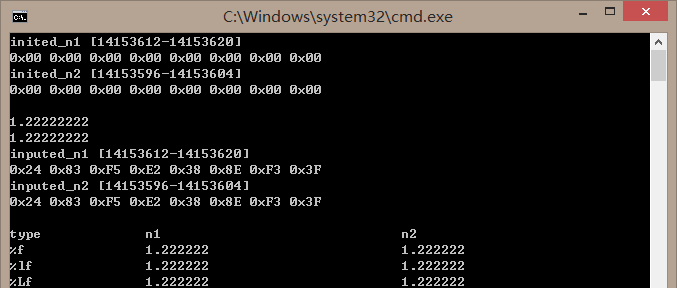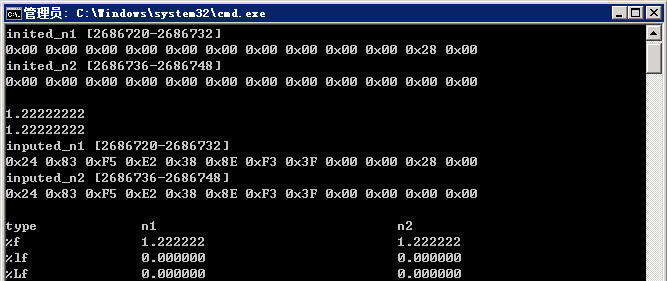关于printf错用格式化字符串导致double和long double输出错误的小随笔
【题外话】
以前用HUSTOJ给学校搭建Online Judge,所有的评测都是在Linux下进行的。后来为了好往学校服务器上部署,所以大家重新做了一套Online Judge,Web和Judge都是基于Windows和.NET平台的。这两天将学校Online Judge中以前在Linux下(GCC 4.6.3)评测的提交全部在Windows上(GCC 4.7.2 MinGW)重测一遍,结果莫名其妙发现很多以前通过的题目现在出现了结果错误的问题,其共同结果都是结果为0,查看源代码发现其都是使用printf("%ld")输出的double。原本以为是GCC的Bug,后来查找资料才发现实际上是对C语言了解不够充分加上MinGW的问题才共同导致的问题。
【文章索引】
把出错的一个提交的代码精简,然后就剩下如下的代码:
#include <cstdio> using namespace std; int main() { double n; scanf("%lf",&n); printf("%.0lf\n",n); return 0; }
在Linux下结果正常:

结果在Windows下会出现如下图的结果:

接下来将上述程序的printf替换为cout,发现没有任何问题,判断是printf那行出现了问题。
查找相关资料(如相关链接1)发现,不论输出float还是double都应该使用printf("%f"),因为不论float还是double都会作为double类型输出,确实以前没有注意到这个问题。所以在第一节给出的那个程序将“%lf”改为“%f”就正确了。但相关链接1中并没有说明%lf指的是什么。
不过如果尝试在GCC上编译如下的代码却会给出如下图的警告:
#include <cstdio> using namespace std; int main() { long double n = 1.22222222; printf("%f", n); printf("%lf", n); return 0; }

也就是说,对于GCC而言,在printf中使用“%f”和“%lf”实际上都表示的是double类型,而要表示long double,则应该使用“%Lf”(注意大小写),而使用MSVC编译编译时并没有发生这些问题(也可能是因为MSVC认为double = long double,所以一切都一样了吧)。
虽然上一节找出了第一节程序的问题,可是为什么会出现这样的问题呢。
继续查找发现了相关链接2和相关链接3,发现在这两个问题的回答中都提到了MinGW在Windows上运行是需要MSVC的运行时的。以前确实也没注意到这点,于是去MinGW的官方网站,确实发现了如下两段:
MinGW provides a complete Open Source programming tool set which is suitable for the development of native MS-Windows applications, and which do not depend on any 3rd-party C-Runtime DLLs. (It does depend on a number of DLLs provided by Microsoft themselves, as components of the operating system; most notable among these is MSVCRT.DLL, the Microsoft C runtime library. Additionally, threaded applications must ship with a freely distributable thread support DLL, provided as part of MinGW itself).
MinGW compilers provide access to the functionality of the Microsoft C runtime and some language-specific runtimes. MinGW, being Minimalist, does not, and never will, attempt to provide a POSIX runtime environment for POSIX application deployment on MS-Windows. If you want POSIX application deployment on this platform, please consider Cygwin instead.
果然,MinGW虽然不需要任何第三方的运行库,但是需要微软的运行库,其中包括了MSVCRT.DLL以及其他的微软C语言运行库。所以GCC编译后的程序还是运行在MSVC运行库上的程序。同时又由于32位的MSVC并不支持更高精度的double类型(在32位的MSVC中long double与double的精度均为8位,见相关链接4),而GCC在32位的long double是12字节,64位更是16字节,所以就出现了不兼容的问题。
所以我们可以做这样一个实验,将long double类型存储的数据按字节输出、同时按不同方式输出其结果,代码如下:
1 #include <cstdio> 2 using namespace std; 3 4 void print_bytes(const char* name, long double &n) 5 { 6 char* p = (char*)&n; 7 8 printf("%s [%ld-%ld]\n", name, p, p + sizeof(long double)); 9 10 for (int i = 0; i < sizeof(long double); i++) 11 { 12 printf("0x%02X ", (*p & 0xFF)); 13 p++; 14 } 15 16 printf("\n"); 17 } 18 19 int main() 20 { 21 long double n1 = 0; 22 long double n2 = 0; 23 24 print_bytes("inited_n1", n1); 25 print_bytes("inited_n2", n2); 26 printf("\n"); 27 28 scanf("%lf", &n1); 29 scanf("%Lf", &n2); 30 31 print_bytes("inputed_n1", n1); 32 print_bytes("inputed_n2", n2); 33 printf("\n"); 34 35 printf("type \t\t n1 \t\t\t\t n2\n"); 36 printf("%%f \t\t "); 37 printf("%f \t\t\t ", n1); 38 printf("%f\n", n2); 39 40 printf("%%lf \t\t "); 41 printf("%lf \t\t\t ", n1); 42 printf("%lf\n", n2); 43 44 printf("%%Lf \t\t "); 45 printf("%Lf \t\t\t ", n1); 46 printf("%Lf\n", n2); 47 48 return 0; 49 }
分别将这个代码在32位机器上用MSVC和GCC MinGW编译,以及在32位Linux下用GCC编译,可以得到如下的结果(从上到下分别为32位Windows下用MSVC编译、32位Windows下用GCC MinGW编译、32位Linux下用GCC编译):


 可以发现,MSVC下long double为8字节,而GCC编译后的程序不论在Linux下还是在Windows下都为12字节。不过仔细看可以发现,虽然GCC生成的程序占用了12字节,但其只用到了前10字节(后2字节不论怎样赋值其内容都不会发生改变),也就是说GCC的long double实际上是10字节(80bit)的。
可以发现,MSVC下long double为8字节,而GCC编译后的程序不论在Linux下还是在Windows下都为12字节。不过仔细看可以发现,虽然GCC生成的程序占用了12字节,但其只用到了前10字节(后2字节不论怎样赋值其内容都不会发生改变),也就是说GCC的long double实际上是10字节(80bit)的。
除此之外,还可以发现,当使用scanf("%lf")时,不论变量是什么类型的,都是按8字节存储的(即按double类型存储的),而使用scanf("%Lf"),则是按10字节存储的(即按long double类型存储的)。由于在MSVC下double = long double,所以不论怎么混用,结果都是正确的。而在Linux下,我们发现,当存储的long double为真正的long double时(使用scanf("%Lf")),只能使用%Lf输出结果,而long double内存储的内容为double时,只能使用输出double的格式化字符串输出。
所以猜想在GCC MinGW下,可能就像在Linux下存储的double而强制输出long double那样会输出为0一样,存储的内容为double,而MSVC将其认定为long double输出,所以最终结果为0。
【相关链接】
- 为什么printf()用%f输出double型,而scanf却用%lf呢?:http://book.51cto.com/art/200901/106880.htm
- printf and long double:http://stackoverflow.com/questions/4089174/printf-and-long-double
- gcc: printf and long double leads to wrong output:http://stackoverflow.com/questions/7134547/gcc-printf-and-long-double-leads-to-wrong-output-c-type-conversion-messes-u
- Long Double:http://msdn.microsoft.com/en-us/library/9cx8xs15.aspx
|
如果您觉得本文对您有所帮助,不妨点击下方的“推荐”按钮来支持我! 本文及文章中代码均基于“署名-非商业性使用-相同方式共享 3.0”,文章欢迎转载,但请您务必注明文章的作者和出处链接,如有疑问请私信我联系! |


 浙公网安备 33010602011771号
浙公网安备 33010602011771号